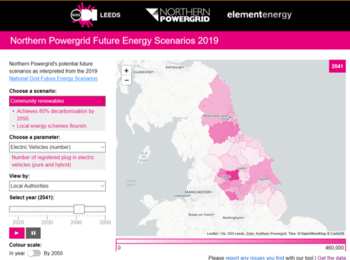 Responses to scenario modelling for low carbon technologies will help distribution networks develop plans that support local net zero commitments
Responses to scenario modelling for low carbon technologies will help distribution networks develop plans that support local net zero commitments
The potential future uptake of low carbon technologies like electric vehicles, heat pumps, rooftop solar PV generation and energy storage have been mapped and made publicly available by Northern Powergrid as part of its 2019 Distribution Future Energy Scenarios (DFES) project. The distribution network operator for Yorkshire, the North East and northern Lincolnshire is now calling for all local authorities, academics and renewable energy project leaders in the area to review the data behind DFES and share any initiatives or projects they are working on that will impact on the underlying planning assumptions. This will help to ensure efficient network planning and effective collaboration across the region as all stakeholders in the region to collectively tackle the pressing challenge of decarbonisation.
DFES is an annual outline of potential future energy pathways. It gives a multi-scenario view of the potential rates of decarbonisation of generation, heating, and transportation, as the region transitions towards a low carbon economy and is built around the four scenarios defined in the National Grid Future Energy Scenarios: consumer evolution, community renewables, steady progression and two degrees. These scenarios outline the likelihood of meeting climate emergency-related targets using different approaches. The 'Community Renewables' scenario, for example, assumes that people will adopt electric transport early and that there is strong support for renewable energy generation.
Understanding any plans that local stakeholders have that may influence the rate of decarbonisation in the region will support Northern Powergrid to more efficiently plan the development of the electricity network and help facilitate regional decarbonisation plans. Following the release of the 2019 DFES data, the operator is now calling for any organisation or stakeholder with high level low carbon plans to review the scenarios and offer any feedback on relevant new plans or contrasting assumptions – for instance planned housing association energy efficiency schemes, significant electric vehicle charging proposals or mass heat pump or energy storage installation. Northern Powergrid is also interested to understand which scenario, if any, best matches stakeholders’ own expectations.
For the 2019 DFES Northern Powergrid has worked in close collaboration with the Element Energy and the Open Data Institute (ODI) Leeds to collate and deliver the data in a number of different formats so those responding to the data can view it in the most suitable format for them including a visualisation tool which presents a time-lapsed geospatial view of the underlying growth assumptions, and their impacts on the network at a local authority level and by primary substation. The data in raw form has been published by Northern Powergrid as part of its commitment to proactively deliver on stakeholder feedback. The maps show the expected concentration of seven key parameters, including heat pumps, electric vehicles, peak demand, rooftop solar PV generation and energy storage, and their impact on the network in terms of energy consumption, peak demand and substation utilisation.
Mary Black, Specialist Electricity Distribution Engineer at Northern Powergrid commented: “At the moment for instance, we can see that Barnsley is projected to have between 9,764 and 46,120 electric vehicles by the end of 2030 across the range of modelled scenarios. We need to understand whether there are any particular plans in Barnsley that will influence the rate of uptake. Similar data is available for other low carbon technologies in all of the areas we operate in. We need all those who are involved in high level low carbon project planning in the region to review the data and share their views. They may have fact-based firm quantitative data of their own they want to share to help us update the figures we have, or a more conversational assessment of future low carbon technology uptake.”
Andrew Spencer, System Planning Manager at Northern Powergrid added: “We know there is a powerful patchwork of plans across our operating area. With more than three quarters of local authorities across our region having declared a climate emergency, this patchwork will be growing into a rich tapestry in the coming months and years. This is the time for us to enter into a proactive dialogue with our regional stakeholders to help us get the local infrastructure right, ensuring that our network is built on a clear evidence-based consensus that meets evolving local needs, while supporting the regional and national decarbonisation pathway.”
Feedback is sought before 31st March 2020 via two principal routes:
- online qualitative and quantitative feedback forms; and
- two dedicated feedback workshops on the 6th March in Leeds and the 13th March in Newcastle which can be booked via the following links:
To support review and feedback:
- an overview of the 2019 DFES figures can be found on the Northern Powergrid website
- the new data visualisation tools can be accessed via a dedicated part of the ODI Leeds site
- all new open data files, together with feedback forms are hosted on Data Mill North’s website.
Patrick Erwin, Northern Powergrid’s Policy and Markets Director, comment: “The 2019 data shows that we, as a region, need to take significant action if we are to meet climate change targets. We are thinking critically about future energy technologies and our drive to create a network that can facilitate the regions ‘net-zero carbon’ aspirations.”
Patrick added: “Releasing our data in this open and accessible way means that others can overlay their data to uncover new findings. This will maximise learnings and knowledge-sharing in our area and we look forward to engaging with stakeholders on these scenarios as part of our consultation commitments to future planning as we develop our RIIO-ED2 business plan. We need to get this right for our regions and ensure that the transition to net zero is fair and just. We can only do that by working closely with our customers and stakeholders.”
Jake Howe, Principal Consultant at Element Energy added: “We have been privileged to support Northern Powergrid in producing their Distribution Future Energy Scenarios. By adapting National Grid’s Future Energy Scenarios to develop scenarios specifically for Yorkshire, the North East and northern Lincolnshire we have been able to provide them with visibility of what a decarbonised future might look like in the region. We now look forward to engaging with local stakeholders to hear how these scenarios could be developed further to reflect their own decarbonisation plans and, in so doing, assisting Northern Powergrid in planning for how their electricity network can help deliver a low carbon future.”
Paul Connell, Founder of ODI Leeds added: “At ODI Leeds, we are delighted to be collaborating with Northern Powergrid to embrace open data and open innovation. Their enthusiasm and proactive approach demonstrates a clear commitment to becoming ‘open by default’, where work and data is shared openly, and people can reach in and participate. The DFES tool we built for them will take complicated concepts and make them easier to understand, allowing for more in-depth engagement from a wider audience, but it wouldn’t have been possible without Northern Powergrid’s open attitude to their own data. The work done on the DFES project so far will help establish a data standard for DFES data - no matter who publishes it – that can be visualised straight away, generating value for other organisations.”
Northern Powergrid are encouraging an open dialogue with all customers on this topic and others as it defines its business plan for the next price control period (RIIO-ED2). For more information on upcoming engagement events head to: https://www.northernpowergrid.com/customer-events-and-surgeries


